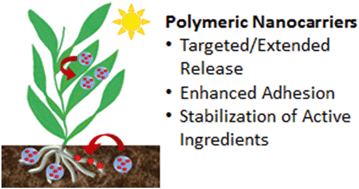当前位置:
X-MOL 学术
›
Environ. Sci.: Nano
›
论文详情
Our official English website, www.x-mol.net, welcomes your
feedback! (Note: you will need to create a separate account there.)
Emerging investigator series: polymeric nanocarriers for agricultural applications: synthesis, characterization, and environmental and biological interactions
Environmental Science: Nano ( IF 5.8 ) Pub Date : 2019/12/09 , DOI: 10.1039/c9en01127g Sheyda Shakiba 1, 2, 3, 4 , Carlos E. Astete 4, 5, 6, 7 , Sachin Paudel 1, 2, 3, 4 , Cristina M. Sabliov 4, 5, 6, 7 , Debora F. Rodrigues 1, 2, 3, 4 , Stacey M. Louie 1, 2, 3, 4
Environmental Science: Nano ( IF 5.8 ) Pub Date : 2019/12/09 , DOI: 10.1039/c9en01127g Sheyda Shakiba 1, 2, 3, 4 , Carlos E. Astete 4, 5, 6, 7 , Sachin Paudel 1, 2, 3, 4 , Cristina M. Sabliov 4, 5, 6, 7 , Debora F. Rodrigues 1, 2, 3, 4 , Stacey M. Louie 1, 2, 3, 4
Affiliation

|
Polymeric nanoparticles represent one major class of nanomaterials that has been proposed to improve the sustainability of agricultural operations by delivering organic agrochemicals such as pesticides more efficiently. Polymeric nanoparticles can improve efficiency through improved targeting and uptake, slow release, and lower losses of the chemicals, while also conferring the benefits of biodegradability and biocompatibility. This review provides a tutorial to environmental nanotechnology researchers interested in initiating research on the development and application of polymeric nanocarriers for delivery of agrochemicals, including pesticides and growth promoters for crops and antibiotics for livestock. In particular, this review covers the wider suite of methods that will be required beyond those typically used for inorganic metal or metal oxide nanoparticles, including synthesis of custom polymeric nanocarriers and characterization and tuning of agrochemical loading and release profiles. Benefits of polymeric nanocarriers are then discussed in terms of the physicochemical properties and fate and transport behaviors that contribute to higher efficiency and lesser environmental impacts compared to traditional (non-nano) formulations. Finally, opportunities for environmental nanotechnology researchers to collaborate with material scientists, microbiologists, and agricultural scientists to optimize the development of polymeric nanocarriers for agriculture are discussed.
中文翻译:

新兴研究者系列:农业应用的聚合物纳米载体:合成,表征以及环境和生物相互作用
聚合物纳米颗粒代表了一类主要的纳米材料,已提出通过提高有机农药的有效利用效率来提高农业生产的可持续性。聚合纳米粒子可通过改善目标和摄取,缓慢释放和降低化学物质损失来提高效率,同时还具有生物降解性和生物相容性的优点。这篇综述为有兴趣开展有关聚合物纳米载体的开发和应用的环境纳米技术研究人员提供了指南,该载体用于农用化学品的运输,包括农药和农作物的生长促进剂以及牲畜的抗生素。特别是,这篇综述涵盖了除无机金属或金属氧化物纳米粒子通常使用的方法以外所需的更广泛的方法,包括定制聚合物纳米载体的合成以及农用化学品负载和释放曲线的表征和调整。然后根据理化性质以及与传统(非纳米)制剂相比有助于更高效率和更少环境影响的理化性质和归宿和运输行为来讨论聚合物纳米载体的益处。最后,讨论了环境纳米技术研究人员与材料科学家,微生物学家和农业科学家合作以优化农业用聚合物纳米载体开发的机会。包括定制聚合物纳米载体的合成以及农药化学负载和释放曲线的表征和调整。然后讨论了与传统(非纳米)制剂相比,物理化学性质以及归宿和运输行为对聚合纳米载体的好处,它们有助于更高的效率和更少的环境影响。最后,讨论了环境纳米技术研究人员与材料科学家,微生物学家和农业科学家合作以优化农业用聚合物纳米载体开发的机会。包括定制聚合物纳米载体的合成以及农药化学负载和释放曲线的表征和调整。然后根据理化性质以及与传统(非纳米)制剂相比有助于更高效率和更少环境影响的理化性质和归宿和运输行为来讨论聚合物纳米载体的益处。最后,讨论了环境纳米技术研究人员与材料科学家,微生物学家和农业科学家合作以优化农业用聚合物纳米载体开发的机会。然后根据理化性质以及与传统(非纳米)制剂相比有助于更高效率和更少环境影响的理化性质和归宿和运输行为来讨论聚合物纳米载体的益处。最后,讨论了环境纳米技术研究人员与材料科学家,微生物学家和农业科学家合作以优化农业用聚合物纳米载体开发的机会。然后根据理化性质以及与传统(非纳米)制剂相比有助于更高效率和更少环境影响的理化性质和归宿和运输行为来讨论聚合物纳米载体的益处。最后,讨论了环境纳米技术研究人员与材料科学家,微生物学家和农业科学家合作以优化农业用聚合物纳米载体开发的机会。
更新日期:2020-02-13
中文翻译:

新兴研究者系列:农业应用的聚合物纳米载体:合成,表征以及环境和生物相互作用
聚合物纳米颗粒代表了一类主要的纳米材料,已提出通过提高有机农药的有效利用效率来提高农业生产的可持续性。聚合纳米粒子可通过改善目标和摄取,缓慢释放和降低化学物质损失来提高效率,同时还具有生物降解性和生物相容性的优点。这篇综述为有兴趣开展有关聚合物纳米载体的开发和应用的环境纳米技术研究人员提供了指南,该载体用于农用化学品的运输,包括农药和农作物的生长促进剂以及牲畜的抗生素。特别是,这篇综述涵盖了除无机金属或金属氧化物纳米粒子通常使用的方法以外所需的更广泛的方法,包括定制聚合物纳米载体的合成以及农用化学品负载和释放曲线的表征和调整。然后根据理化性质以及与传统(非纳米)制剂相比有助于更高效率和更少环境影响的理化性质和归宿和运输行为来讨论聚合物纳米载体的益处。最后,讨论了环境纳米技术研究人员与材料科学家,微生物学家和农业科学家合作以优化农业用聚合物纳米载体开发的机会。包括定制聚合物纳米载体的合成以及农药化学负载和释放曲线的表征和调整。然后讨论了与传统(非纳米)制剂相比,物理化学性质以及归宿和运输行为对聚合纳米载体的好处,它们有助于更高的效率和更少的环境影响。最后,讨论了环境纳米技术研究人员与材料科学家,微生物学家和农业科学家合作以优化农业用聚合物纳米载体开发的机会。包括定制聚合物纳米载体的合成以及农药化学负载和释放曲线的表征和调整。然后根据理化性质以及与传统(非纳米)制剂相比有助于更高效率和更少环境影响的理化性质和归宿和运输行为来讨论聚合物纳米载体的益处。最后,讨论了环境纳米技术研究人员与材料科学家,微生物学家和农业科学家合作以优化农业用聚合物纳米载体开发的机会。然后根据理化性质以及与传统(非纳米)制剂相比有助于更高效率和更少环境影响的理化性质和归宿和运输行为来讨论聚合物纳米载体的益处。最后,讨论了环境纳米技术研究人员与材料科学家,微生物学家和农业科学家合作以优化农业用聚合物纳米载体开发的机会。然后根据理化性质以及与传统(非纳米)制剂相比有助于更高效率和更少环境影响的理化性质和归宿和运输行为来讨论聚合物纳米载体的益处。最后,讨论了环境纳米技术研究人员与材料科学家,微生物学家和农业科学家合作以优化农业用聚合物纳米载体开发的机会。











































 京公网安备 11010802027423号
京公网安备 11010802027423号